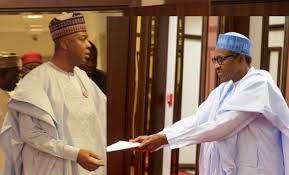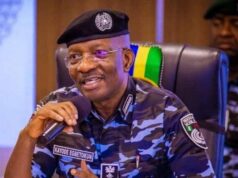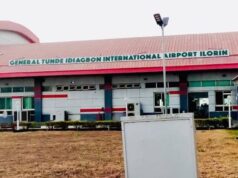 The Federal Government of Nigeria has for the first time in many years, given capital expenditure the biggest share of N1.8 Trillion out of the total 2016 budget of 6.08 Trillions, representing 30 percent of the budget.
The Federal Government of Nigeria has for the first time in many years, given capital expenditure the biggest share of N1.8 Trillion out of the total 2016 budget of 6.08 Trillions, representing 30 percent of the budget.
President Muhammadu Buhari who announced this when he presented the 2016 budget proposal to the joint session of the National Assembly today in Abuja, said that the capital expenditure portion of the budget for last year was N557 billion. The budget has a total revenue projection of N3.86 trillion with a deficit of N2.22 trillion against the background of 2015 budget.
“Distinguished and honourable members of the National Assembly, for the first time in many years, capital expenditure will represent 30% of our total budget. In future years we intend to raise the percentage allocation for capital expenditure.”
President Buhari said that this is a fulfillment of the government’s promise to align expenditure to the long-term objectives, and a sign of government’s commitment to sustainable development. According to him, this increased capital expenditure, commits significant resources to critical sectors such as Works, Power and Housing – N433.4 billion; Transport – N202.0 billion; Special Intervention Programs – N200.0 billion; Defence – N134.6 billion; and Interior – N53.1 billion. “These investments in infrastructure and security are meant to support our reforms in the Agriculture, Solid Minerals and other core job creating sectors of our economy.
Buhari who made it clear that his government would invest to safeguard lives and property, adding: “We will invest in equipping our farmers with the right tools, technology and techniques.
“We will invest in empowering and enabling our miners to operate in a safe, secure and humane environment.
“We will invest in training our youths, through the revival of our technical and vocational institutions, to ensure they are competent enough to seize the opportunities that will arise from this economic revival.
“Indeed, the future looks bright. And I ask that we all work together to make this vision a reality. The 223% year on year growth in capital expenditure demonstrates our desire to make Nigeria more competitive, and start the journey to deliver sustainable development in our country.”
The President said that in fulfillment of his promise to run a lean government, he has proposed a 9 percent reduction in non-debt recurrent expenditure, from N2.59 trillion in the 2015 Budget to N2.35 trillion in 2016.
He said that N300 billion has been budgeted for Special Intervention Programs, which takes the total amount for non-debt recurrent expenditure to N2.65 trillion.
“As I mentioned earlier, the Efficiency Unit set up by this Administration together with effective implementation of GIFMIS and IPPIS will drive a reduction of overheads by at least 7%, personnel costs by 8% and other service wide votes by 19%. Distinguished and honourable members, this budget will be executed to provide optimum value by ensuring every naira spent by this Government, counts.
“We will devote a significant portion of our recurrent expenditure to institutions that provide critical government services. We will spend N369.6 billion in Education; N294.5 billion in Defence; N221.7 billion in Health and N145.3 billion in the Ministry of Interior. This will ensure our teachers, armed forces personnel, doctors, nurses, police men, fire fighters, prison service officers and many more critical service providers are paid competitively and on time.”
President Buhari said that the 2016 borrowings will be principally directed to fund the capital projects even as he said that sum of N113 billion will be set aside for a Sinking Fund towards the retirement of maturing loans; while N1.36 trillion has been provided for foreign and domestic debt service. This calls for prudent management on our part, both of the debt portfolio and the deployment of our hard earned foreign exchange earnings.
“I am aware of the problems many Nigerians currently have in accessing foreign exchange for their various purposes – from our traders and business operators who rely on imported inputs; to manufacturers needing to import sophisticated equipment and spare parts; to our airlines operators who need foreign exchange to meet their international regulatory obligations; to the financial services sector and capital markets who are key actors in the global arena.
“These are clearly due to the current inadequacies in the supply of foreign exchange to Nigerians who need it. I am however assured by the Governor of Central Bank that the Bank is currently fine-tuning its foreign exchange management to introduce some flexibility and encourage additional inflow of foreign currency to help ease the pressure.’
The President said that the deficit in the 2015 budget, which is equivalent to 2.16 percent of Nigeria’s GDP, will take the nation’s overall debt profile to 14 percent of our GDP.
“This remains well within acceptable fiscal limits. Our deficit will be financed by a combination of domestic borrowing of N984 billion, and foreign borrowing of N900 billion totaling N1.84 trillion. Over the medium term, we expect to increase revenues and reduce overheads, to bring the fiscal deficit down to 1.3% of GDP by 2018.”
According to him, in 2016, oil related revenues are expected to contribute N820 billion even as non-oil revenues, comprising Company Income Tax (CIT), Value Added Tax (VAT), Customs and Excise duties, and Federation Account levies, will contribute N1.45 trillion. Finally, by enforcing strict compliance with the Fiscal Responsibility Act, 2007 and public expenditure reforms in all MDAs, we have projected up to N1.51 trillion from independent revenues.
“Although we are working to diversify our economy, we will not lose sight of the need to restructure the oil and gas sector which has been marred by corruption and plagued with inefficiencies. Accordingly, I have directed the Petroleum Products Pricing Regulatory Agency (PPPRA) to adjust its pricing template to reflect competitive and market driven components. We believe this can lower input costs and attain efficiency savings that will enable PPPRA to keep the selling price for all marketers of petrol at N87 per liter for now.
“The current fuel scarcity with long queues at petrol stations all over the country causing social dislocation is very unfortunate. Government profoundly apologizes to Nigerians for this prolonged hardship and misery. It is as a result of market speculators and resistance to change by some stakeholders. Government is working very hard to end these shortages and bring fuel to the pumps all over the country.
“I have also directed the NNPC to explore alternate funding models that will enable us to honour our obligations in Joint Ventures (JVs) and deep offshore fields. We are confident that these measures can be achieved and will lower the burden that the traditional cash calls have imposed on our budget and cash flows as well as contribute towards shoring up our national reserves.” [myad]






